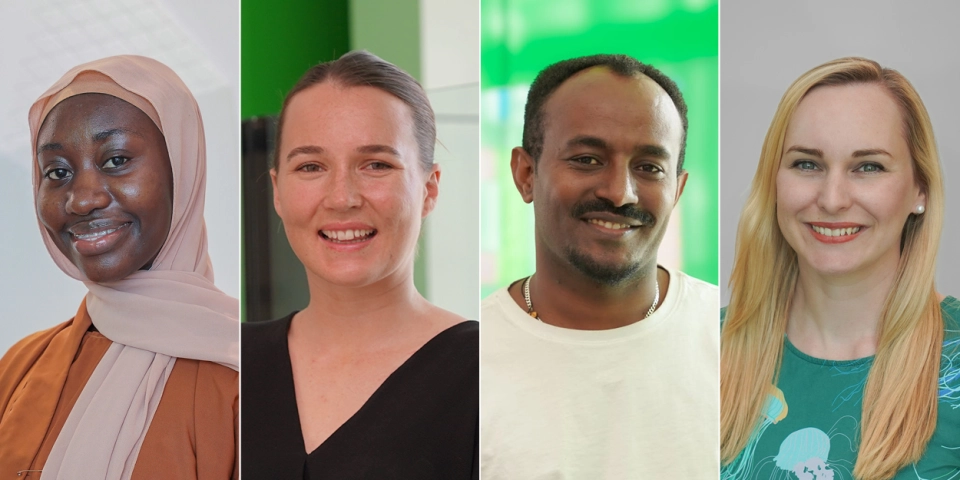
Pictured left to right: Fatoumata Camara, Tiffany Bradshaw, Temesgen Akalu and Sonia McAlister.
We are pleased to announce latest recipients of the Stan and Jean Perron Awards, that recognise the work of exceptional postgraduate students who are undertaking their research projects at The Kids Research Institute Australia.
A big congratulations to our PhD students Temesgen Akalu and Sonia McAlister who are the latest recipients of the Stan and Jean Perron Career Launching Awards, and Tiffany Bradshaw and Fatoumata Camara who were awarded the Stan & Jean Perron Top-up Scholarships.
The Stan and Jean Perron Awards were established at The Kids in 2005 thanks to the generosity of The Stan Perron Charitable Foundation. Now encompassing three awards, the Excellence Awards, the Top-up Scholarships, and the recently established Career Launching Awards, the Stan and Jean Perron Awards have supported near to 100 postgraduate students and fellows who have dedicated their careers to improving the health and wellbeing of children.
Stan & Jean Perron Career Launching Awards
This award supports new PhD students make the transition and launch into their postdoctoral careers, enabling them to continue their research and publish during the ‘in- between time’ of thesis submission and post doctorate opportunities.
Temesgen Akalu is an infectious disease and spatial epidemiologist with a research interest that employs advanced epidemiological and statistical analysis. Currently, he is a PhD student at Curtin University and a Research Assistant in the Geospatial and Tuberculosis (GeoTB) team. His research focuses on the long-term sequelae (after-affects) of patients with multidrug and extensively drug-resistant tuberculosis (DR-TB) in Hunan Province, China. Tuberculosis is the leading cause of death from an infectious disease worldwide, killing more than one million people every year. By identifying risk factors associated with post-TB sequelae, including forecasting and mapping of the infectious disease in geographic areas, Temesgen aims to design effective strategies to tackle and control infectious and neglected tropical diseases in high-burden countries such as Sub-Saharan Africa, Southeast Asia, and the Pacific region, and improve outcomes and the quality of life for tuberculosis survivors.
Sonia McAlister is a Postdoctoral Researcher in the Vaccine Trials Group at the Wesfarmers Centre of Vaccines and Infectious Diseases (WCVID), with a research focus on whooping cough immunity. Despite excellent vaccine uptake, whooping cough (pertussis) remains one of the most poorly controlled vaccine-preventable diseases in Australia. During her PhD, Sonia showed that maternal antibodies can impact how well babies respond to their other routine childhood immunisations which may leave them susceptible to dangerous infections. She is now committed to optimising vaccine schedules to ensure that everyone, from newborns to the elderly, get the right vaccine at the right time to stay protected throughout their life; and understanding how vaccines can interact with each other and the wider immune system. By refining how vaccines are delivered, Sonia’s research aims to break the cycle of preventable illness, giving every child the best chance at a healthy start in life and ensuring no family endures the heartbreak of losing a loved one to a vaccine-preventable disease.
Stan & Jean Perron Top-up Scholarship
The Top-Up Scholarship supports new exceptional higher degree by research (HDR) students undertaking their research project at the Institute, and provides an annual stipend for up to three years with an additional allowance to support their studies including training, travel and conferences; enabling students to have additional resources, attend conferences to advance their learning and network with peers, present to colleagues, and learn from others in their area of research.
Tiffany Bradshaw is a PhD student at Curtin University and Research Assistant in the Children’s Foundations of Lung Disease Health team at the Wal-yan Respiratory Research Centre, focusing on lung disease in people born at <37 weeks' gestation. Preterm birth survivors often face ongoing breathing problems, lung damage, issues with blood vessels in the lungs, and lasting obstructive airway disease throughout their lives. For some people born preterm, lung disease worsens gradually over time, causing their lung function to deviate from the expected normal trajectory. Tiffany’s PhD titled “Developing phenotypic clusters of prematurity-associated respiratory disease” aims to categorise the different characteristics of lung disease among young people born preterm by developing lung disease profiles, using specialised statistical methodology. By identifying lung disease profiles in survivors of preterm birth, Tiffany aims to optimise diagnosis, early intervention, and treatments to improve lifelong lung health in this population. Her project is embedded in FINGERPRINT study: ‘FINGERPRINT: FINdinG Early markers of Respiratory disease for survivors of PReterm birth which IdeNtify Treatable traits’ – a five-year project funded by the Medical Research Future Fund (MRFF) grant.
Fatoumata Camara is a PhD student at the University of Western Australia and Research Assistant in the Strep A Pathogenesis and Diagnostics team at the Wesfarmers Centre of Vaccines and Infectious Diseases (WCVID), focusing on immune system responses to Group A Streptococcal (Strep A) – a bacterium often found in the throat and on the skin. While most Strep A infections cause mild illnesses, some individuals are more susceptible to severe illnesses including sepsis, flesh-eating disease and rheumatic heart disease (RHD), Fatoumata’s research is focused on the colonisation and infection of Strep A in paediatric populations, aspiring to improve health outcomes in her home country of Gambia, by developing improved ways to diagnose, treat and prevent the infection. Her PhD, titled ‘Deciphering natural immunity to Streptococcus pyogenes to prevent rheumatic heart disease,” focuses on understanding how the human immune system responds to Streptococcus pyogenes infections, using advanced techniques and insights from diverse populations to inform novel strategies and prevent the colonisation and progression of Strep to severe illnesses.
At The Kids, we are committed to developing young researchers and providing them with the skills and experience necessary for a successful independent research career. We are deeply grateful that the Stan Perron Charitable Foundation shares this commitment.
